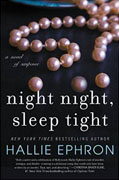Night Night, Sleep Tight
Hallie Ephron
book reviews:
· general fiction
· chick lit/romance
· sci-fi/fantasy
· graphic novels
· nonfiction
· audio books
· author interviews
· children's books @
curledupkids.com
· DVD reviews @
curledupdvd.com
newsletter
win books
buy online
links
home
for authors
& publishers
for reviewers

 |
Night Night, Sleep Tight Hallie Ephron William Morrow Hardcover 304 pages March 2015 |
|
Secrets and lies. The stuff of Hollywood movies. Raised among movie glitterati of the 1960s, Deidre Unger, daughter of screenwriter Arthur Unger and his wife, Gloria, is familiar with that rarified world as a member of the Beverly Hills cognoscenti, plagued with public scandals, applauded for starring roles that obscure the truth: their feet are made of clay; they’re mortals, not gods. Deirdre’s best friend in the '60s is Joelen Nichol, daughter of the legendary “Bunny” Nichol, a star at the peak of her career. But the night Joelen kills Bunny’s gangster lover in self-defense is the same night Deidre is involved in a terrible accident that permanently cripples one leg, a barely-remembered nightmare other than her father rushing her to a hospital for treatment.
Fortunately, Deirdre and Haney are still able to avail themselves of longtime family friend and attorney Sy Sterling while awaiting the arrival of their mother. Sy is the attorney who secured an acquittal for Joelen Nichol in the murder of her mother’s boyfriend in the '60s. Now Joelen is a real estate agent, still living with her famous mother. Joelen appears at the Ungers' door soon after the discovery but quickly excuses herself when learning of Unger’s death. The two friends haven’t seen each other for years; their friendship ended abruptly with Deirdre’s convalescence from the accident and Joelen’s need for privacy after the trial. (Such events are part of Hollywood lore, the constant headline-grabbing scandals and personal failings of larger-than-life men and women. Ephron attempts to maintain the Hollywood luster throughout the tale, inserting the names of actors from the golden age of films and the famous personalities that peopled both Deirdre and Joelen’s young lives.) There’s nothing abnormal about the Unger family in Beverly Hills: Arthur’s fading career, Henry’s aimlessness since his teens, Deirdre’s efforts to build a successful independent business in San Diego, even a mother who has chosen an alternative path as a Buddhist. By necessity, old grudges and hurts are put aside in the current crisis, Deidre belatedly attempting to learn the details of her life-changing accident, but a blur in her memory. By 1985, her perspective has changed, though her emotional connections are rooted in the past. A visit to Joelen and Bunny only prompts more unanswered questions, Deirdre falling down the proverbial rabbit hole as the past intrudes on the present. Though Ephron offers a peek into the extravagant Hollywood/Beverly Hills lifestyles of the rich and famous, it is only a glossy black-and-white image, bereft of color or character development and with an ending that would only find credence in a B film. Save the resources to cover up career-ending revelations, the human failures at the heart of Unger’s murder and Deidre’s betrayal as old as original sin, ugly secrets dressed up for the camera where the vile behavior bears the sheen of glamour. Originally published on Curled Up With A Good Book at www.curledup.com. © Luan Gaines, 2015 |
| Also by Hallie Ephron: |
|
|
|
 Click here to learn more about this month's sponsor! |
|
| fiction · sf/f · comic books · nonfiction · audio newsletter · free book contest · buy books online review index · links · · authors & publishers reviewers |
|
| site by ELBO Computing Resources, Inc. | |
 Twenty-two years later, in 1985, much has changed for the once affluent family. Arthur Unger’s career is in decline, his Beverly Hills home about to be sold to meet financial obligations. Deirdre
is due to arrive from San Diego to help organize the house despite the resistance of her brother, Henry, who still lives with Arthur. Failing to get a response from persistent knocking, Deirdre goes around the perimeter of the locked house, where she sees her father’s body, facedown in the swimming pool. Her brother finally aroused from sleep, the siblings calls authorities, only to be shocked by the arrival of detectives who refuse to rule out murder as a cause of death.
Twenty-two years later, in 1985, much has changed for the once affluent family. Arthur Unger’s career is in decline, his Beverly Hills home about to be sold to meet financial obligations. Deirdre
is due to arrive from San Diego to help organize the house despite the resistance of her brother, Henry, who still lives with Arthur. Failing to get a response from persistent knocking, Deirdre goes around the perimeter of the locked house, where she sees her father’s body, facedown in the swimming pool. Her brother finally aroused from sleep, the siblings calls authorities, only to be shocked by the arrival of detectives who refuse to rule out murder as a cause of death.